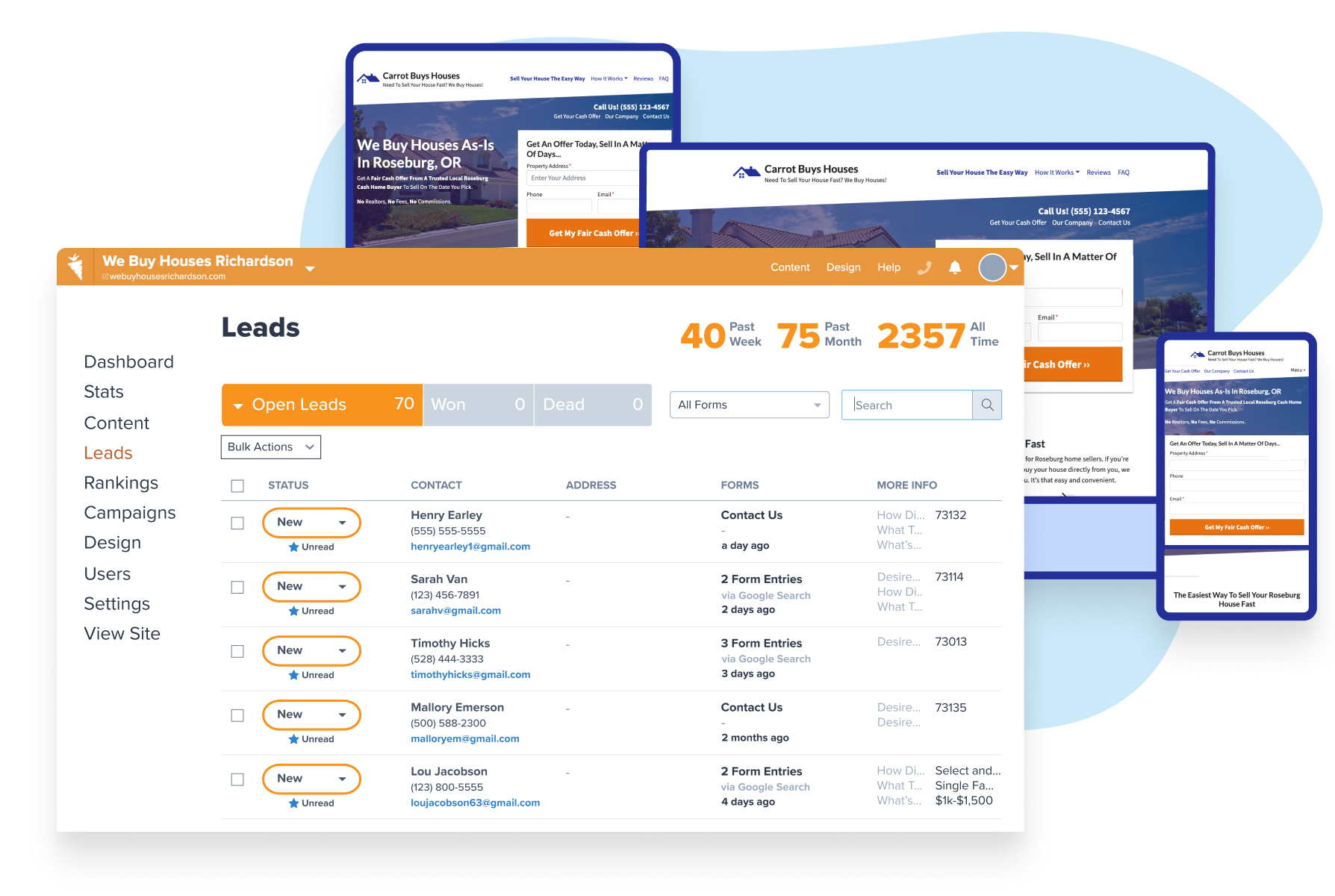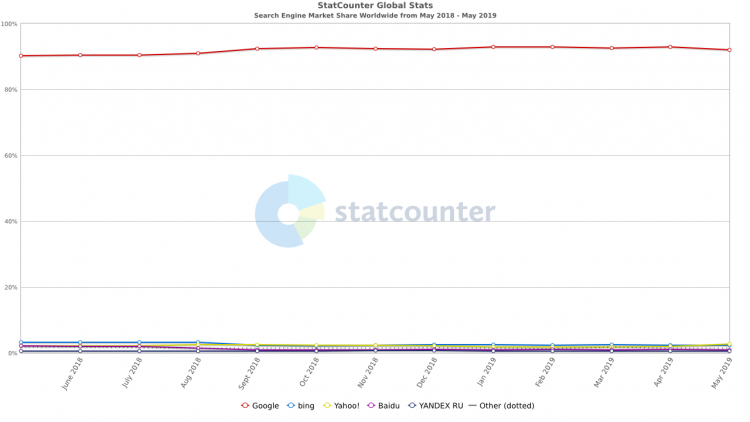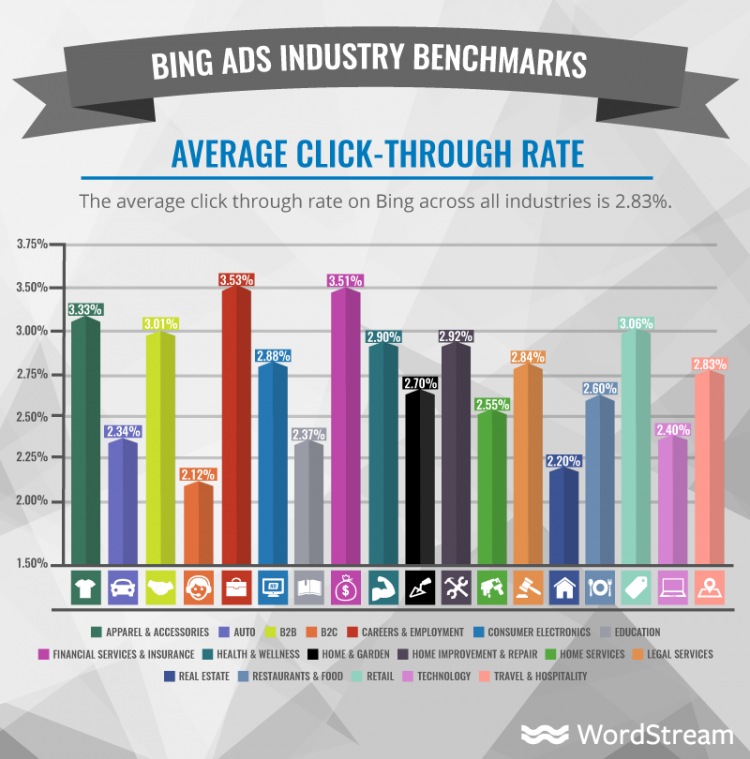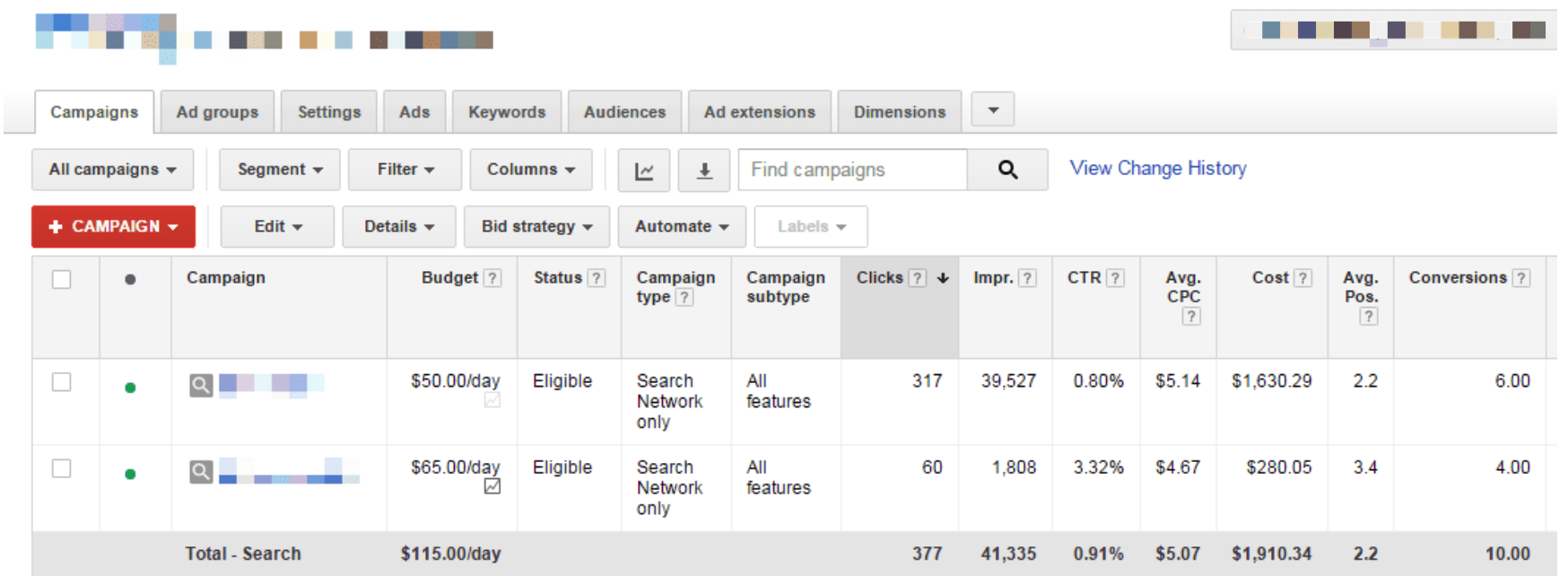Are you dismissing Bing PPC for real estate investors because that “guy” in the online forums said it’s not worth using it? Is your Google Ads campaign killing your marketing budget?

Demo Carrot: How many deals are you losing to your competitor’s website?
Take a Free DemoWhat if I told you Bing might help you attract extra leads at a lower cost (if you do it right)?
“For me, Bing Ads is too expensive. The conversion rates just suck…” via Reddit
“Bing Ads are s*** compared to Google Ads in my experience”. via Reddit
We see these kinds of comments about Bing PPC for real estate investors all of the time. You probably do as well.
We’re often asked, “Is Bing PPC worth it as an additional source for real estate investor advertising?”
So, we wanted to find out… and we started testing, which we dive into below. Also, we’ll show some of the advantages Bing can have over AdWords.
Don’t Assume That Google Ads Is The Only Game In Town For PPC Marketing
When prospects search online for a real estate professional (this applies to investors and agents), you want to be on the first page.
Because if you are, people will click on your result, they’ll visit your website, and there’s a darn good chance they’ll even become a lead (at the very least, you can tag them once they visit your website and retarget them with Facebook ads — learn more over here).
And leads from search engines are typically much higher quality than direct mail leads, bandit sign leads, or even door knocking or cold calling leads.
Because they came looking for you.
However, in the world of search engines and PPC, Google Ads reign supreme. Google, after all, dominates nearly 95% of all search engine traffic.
But in this article, we’re not talking about Google Ads. We’re talking about Microsoft Advertising (the advertising platform behind Bing, a search engine mockingly acronym as “But It’s Not Google”), which holds about 2.39% of the world’s search engine market share.
That begs the question: why are we discussing Microsoft Advertising?
Well, there are a few advantages you should be aware of.
Should You Use Microsoft Advertising?
While holding 2.20% of the world’s search engine market share seems small and insignificant, those two percentage points still amount to 12 billion searches per month. Everyone searches online. Most people do it daily, so owning a few percentage points of the world’s search engine share is more powerful than it seems.
And here’s the other thing: most people only use one search engine.
If you’re a Google user (and you probably are), when is the last time you searched using Bing, Yahoo, or DuckDuckGo?
Yeah… don’t even remember. Neither do I. And neither do most people.
Most online searchers use a single search engine and rarely stray.
This means that the people who search using Bing… you’ll seldom reach those same searchers with Google Ads. Conversely, you’ll rarely reach Google Ads users when using Microsoft Advertising.
Searchers don’t cross platforms. This means to reach all of your prospects, your business should.
But look — I’m not going to tell you that you have to advertise on Bing; it’s your call. I want to point out that running a Microsoft Advertising campaign in addition to your Google Ads campaign can give you a competitive edge in your market: you’ll reach the people who your competitors aren’t probably even advertising to.
Because since Google is the biggest, most visible search engine, everyone knows about it, including your competitors. And they’re advertising on it.
Bing? Maybe not. Using Microsoft Advertising could help you snag leads that your competition outright ignores.
Is Bing PPC for real estate investors worth it? Here’s What We Found…
Carrot Member Google Ads Campaign
With that success with Google Ads, we wanted to see if we could “stack” on more leads by adding Bing PPC to the picture. As you can see, he invested $1,910 in ad costs during those 30 days in Google Ads and collected ten confirmed online opt-in leads… and many other phone call leads. Counting the phone call leads brings his cost per lead down to under $100 per lead.
Same Carrot Member Bing PPC Campaign
Now let’s compare them both apples to apples across the board.
Clicks:
- Google Ads: 377
- Bing: 338
Google Ads had 11.5% more clicks by volume
Impressions:
- Google Ads: 41335
- Bing: 24660
Google Ads had 68% more impressions by volume
Click Through Rate:
- Google Ads: .91%
- Bing: 1.37%
Bing had a 50% greater click-through rate by a percentage
Cost Per Click:
- Google Ads: $5.07
- Bing: $3.32
Google Ads cost per click was 53% higher than Bing
Conversions:
- Google Ads: 10
- Bing: 6
Google Ads (for this specific market) only had 4 more online leads in total (doesn’t count phone call leads).
Total Invested:
- Google Ads: $1910.34
- Bing: $1123.65
Google Ads overall spending was 70% higher than Bing and yielded 40% more leads.
Just one thing to remember from this test… the cost per lead in this campaign is higher than our typical cost per lead on PPC. The client wanted us to test a set of 6,000 broad match keywords he received from a mentor… vs. our more targeted approach to PPC management.
The cost per lead on that broad match keyword group is 5x higher than on our targeted group… for the same number of leads. But the client is ok with that higher cost per lead because his margins on deals are so high that it ensures he’s not missing any leads.
Bing delivers lower search volume but a more attractive cost per lead.
Of course, you’ll get more impressions and clicks on Google Ads, but you’ll usually pay more per click for those visitors.
It’s not that one is better than the other… this post is mainly to lay out the argument that Bing is a very valid PPC marketing platform that, in this month-long test, pulled leads that cost us less than we pay for leads from Google.
More… Quick Microsoft Advertising Stats
Here are some stats about Bing and Microsoft Advertising to keep your mind churning and informed.
- Bing has about 1.3 billion, unique monthly visitors.
- Bing has about 500 million monthly search volume from the United States.
- Microsoft Advertising generally has a lower cost-per-click than Google.
- Google Ads’ click-through rate has been neck-and-neck with Microsoft Advertising click-through rate, around 2.5%.
- Bing offers better support to advertisers with lower budgets.
7 Reasons Why You Shouldn’t Ignore Bing PPC For Real Estate Leads…
1. Bing PPC offers cheaper CPCs (costs per click) and potentially higher ROI
This is primarily because fewer investors use Bing over Google Ads. Bing Ads generally has lower competition than Google Ads, especially in the real estate industry. With fewer advertisers competing for the same keywords and targeting options, the cost per click (CPC) on Bing Ads tends to be lower. Real estate investors can use this lower competition to secure motivated seller leads at a more cost-effective rate.
Here are some additional reasons by CPCs are lower on Bing:
- Cost-Effective Advertising: Lower CPCs on Bing Ads translate to lower advertising costs for real estate investors. By paying less per click, investors can stretch their advertising budget further, enabling them to reach more motivated sellers within their allocated budget. This cost-effectiveness can lead to a higher return on investment (ROI) for investors, as they can generate more leads and conversions for a lower cost compared to other advertising platforms.
- Targeting Specific Audience: Bing Ads allows precise targeting options, including demographics, location, and search intent. Real estate investors seeking motivated seller leads can leverage these targeting options to reach their desired audience more effectively. By narrowing down their target audience and focusing on specific geographic areas or relevant search terms, investors can ensure their ads are shown to users actively looking for real estate information or intending to sell their properties. This focused targeting can result in higher conversion rates and an improved ROI.
- Unique User Base: Bing has a distinct user base that often differs from Google’s audience. Bing users tend to be older, more affluent, and more likely to be homeowners. These characteristics align well with the target audience of real estate investors seeking motivated sellers. By advertising on Bing Ads, investors have the opportunity to connect with this specific user base and potentially find motivated sellers who are more likely to engage with their ads and pursue a real estate transaction.
Considering these factors, Bing Ads can offer real estate investors seeking motivated seller leads a cost-effective advertising solution with cheaper CPCs and potentially higher ROI. By leveraging the lower competition, cost-effectiveness, precise targeting options, and unique user base of Bing Ads, investors can maximize their ad spend, generate more leads, and increase their chances of finding motivated sellers interested in their real estate offerings.
2. The Expanding Reach of Bing PPC
Bing PPC has experienced remarkable growth, solidifying its position as a formidable advertising platform. With the integration of Microsoft Advertising and Bing, its reach has expanded significantly, capturing a substantial share of search queries.
In fact, Bing now powers over 30% of all search queries in the United States. Ignoring Bing PPC could mean missing out on a sizable portion of potential leads and lucrative real estate investment opportunities.
3. Bing Ads offers new ad features!
Since 2022, Microsoft Advertising (formerly Bing Ads) has introduced several changes to its ad structure to enhance the advertising experience for marketers. Here are some notable updates:
- Expanded Text Ads: Microsoft Advertising introduced Expanded Text Ads, allowing advertisers to create more compelling and informative ads. Expanded Text Ads feature additional headline and description fields, providing more space for advertisers to highlight their products or services. This update allows for more creative and engaging ad copy, improving click-through and conversion rates.
- Image Extensions: To make ads more visually appealing, Microsoft Advertising introduced Image Extensions. This feature enables advertisers to add relevant images to their ads, helping them capture the attention of potential customers. By incorporating visual elements into their ads, advertisers can effectively convey their brand messages and increase ad engagement.
- Callout Extensions: Callout Extensions allow advertisers to include additional text to highlight unique selling points, key benefits, or special features of their products or services. This update gives advertisers more flexibility to communicate essential information to potential customers and differentiate themselves from competitors. By leveraging Callout Extensions, advertisers can increase the relevance and impact of their ads.
- Dynamic Search Ads: Dynamic Search Ads (DSA) were improved to provide more accurate and relevant ad targeting. This feature enables advertisers to automatically generate ads based on the content and keywords on their websites. Microsoft Advertising’s DSA now offers improved page coverage and refined targeting options, ensuring that ads are shown to users actively searching for related products or services.
These updates to the ad structure in Microsoft Advertising (formerly Bing Ads) offer advertisers more versatility, improved visibility, and better opportunities to engage with their target audience. By leveraging these features, marketers can create more impactful and effective ad campaigns on the platform.
4. Syndication across the Microsoft Advertising Network
Bing PPC allows real estate investors to syndicate their ads across the expansive Microsoft Advertising Network. This network includes popular platforms such as MSN, Outlook, and Microsoft Edge, ensuring broader exposure and increased visibility for investment opportunities.
By leveraging the Microsoft Advertising Network, investors can reach a wider audience, attracting qualified traffic to their websites or landing pages and expanding their potential for successful real estate transactions.
5. Bing PPC offers flexibility!
The differences in Bing Ads ad groups can benefit real estate investors seeking motivated seller leads. Here’s how these differences can be advantageous:
- More Descriptive Ad Group Naming: With a higher character limit for ad group naming in Bing Ads, real estate investors can use more descriptive and detailed names. This allows investors to organize their ad groups to align closely with their real estate investment strategies.
Using descriptive names, investors can easily identify and manage ad groups targeting specific geographic areas, property types, or other relevant criteria. This level of organization can streamline campaign management and make tracking the performance of individual ad groups easier. - Inclusion of Search Partners by Default: Bing Ads includes search partners as part of the ad group targeting by default. Real estate investors using Bing Ads can extend their reach beyond Bing’s search engine to include partner websites such as Yahoo and other affiliated search networks.
By default, investors can potentially reach a wider audience and increase the exposure of their motivated seller ads. This expanded reach can lead to more opportunities to connect with motivated sellers searching for real estate information on partner websites. - Default Ad Distribution on Bing Ads: Bing Ads has a default ad distribution setting of “All” within an ad group. Real estate investors’ ads are automatically eligible to appear on Bing, Yahoo, and search partner sites without additional configuration.
This broader ad distribution can increase the visibility of ads and generate more impressions, potentially reaching a larger pool of motivated sellers. Investors using Bing Ads can leverage this default setting to expand their ad reach and increase the likelihood of connecting with motivated seller leads. - Ad Extensions at the Ad Group Level: Bing Ads allows real estate investors to set ad extensions at the ad group level. This gives investors greater control and flexibility in associating ad extensions with specific ad groups. Real estate investors can utilize ad extensions such as call extensions, site link extensions, or location extensions at the ad group level to enhance the visibility and relevance of their ads.
By customizing and optimizing ad extensions at the ad group level, investors can provide additional information and relevant contact details to potential motivated sellers, increasing the chances of engagement and lead generation.
Real estate investors can benefit from enhanced organization, broader ad distribution, and more control over ad extensions by taking advantage of these specific features in Bing Ads ad groups. These benefits can help investors effectively target motivated seller leads, increase ad visibility, and drive better engagement, ultimately maximizing their chances of connecting with potential motivated sellers and securing profitable real estate transactions.
6. Bing Ads have better device targeting options.
Device targeting options in Bing Ads can benefit real estate investors seeking motivated seller leads. Here’s how real estate investors can leverage these options effectively:
- Mobile Device Targeting: Since many users now rely heavily on mobile devices for their online activities, targeting mobile devices can be a strategic move for real estate investors. Mobile targeting allows investors to reach potentially motivated sellers searching for information on their smartphones or tablets.
By tailoring campaigns specifically for mobile users, investors can capture the attention of on-the-go sellers, increasing the likelihood of engaging with motivated leads. - Location-Based Targeting: Bing Ads provides location targeting options, allowing real estate investors to focus on specific geographic areas known for motivated seller activity. By combining location and device targeting, investors can effectively reach potential sellers in their desired locations using mobile devices to search for real estate information. This precise targeting ensures that investors connect with motivated sellers in their target market, maximizing the chances of generating high-quality leads.
- All Device Targeting: Real estate investors can opt for all device targeting to ensure maximum campaign exposure and reach. By targeting all devices, including desktops, mobile devices, and tablets, investors can cover a broader audience and increase the chances of capturing motivated seller leads across various devices.
This comprehensive approach allows investors to reach potential sellers regardless of their preferred device, ensuring a higher chance of engagement and lead generation. - Bid Adjustments for Device Performance: Bing Ads allows investors to adjust bids based on device performance. By closely monitoring the performance of their campaigns on different devices, investors can identify which devices are driving the most conversions and adjust their bids accordingly.
For example, if mobile devices show higher conversion rates, investors can increase their bids for mobile targeting to allocate a larger portion of their budget to the most effective device. This optimization strategy helps investors maximize their return on investment and generate more motivated seller leads.
Real estate investors can utilize device targeting options in Bing Ads to connect with motivated seller leads. By targeting mobile devices, focusing on specific locations, using all device targeting for maximum exposure, and adjusting bids based on device performance, investors can enhance their campaigns’ effectiveness, increase engagement, and generate more quality leads from motivated sellers.
7. Bing Ads platform is ideal for companies with a small budget!
While Google Ads remains a popular choice, Bing PPC often offers a cost-effective alternative for real estate investors. In some instances, Bing PPC can provide a lower cost-per-click (CPC) compared to Google Ads, enabling investors to stretch their advertising budget further and achieve a higher return on investment (ROI).
By optimizing campaigns and implementing strategic bidding, investors can maximize their ad spend on Bing PPC, attracting motivated prospects without breaking the bank.
Is Bing PPC Right For Your Real Estate Investing Business?
It can help you tap into new leads you’d never otherwise reach on Google. That’s for sure.
If just maybe… especially if you need to start on a smaller budget to test the waters.
If your advertising campaign is limited to a small geographic area, Google Ads might be the platform where you’ll gain significant search volume, depending on your keywords and match types. Higher search volume means more potential customers for your business.
Yes, Google Ads is still the “empire” for paid search, with most of the market share. For that reason, Bing Ads is often an afterthought that doesn’t get much attention. But Bing has some unique capabilities that most folks do not use. If you optimize for these Bing Ads only features, you’re sure to increase performance significantly.
There isn’t a right or wrong answer to advertising on Google Ads vs. Bing Ads.
They’re both great platforms with their advantages and disadvantages. But the analyst inside of all great advertisers should prefer to test both. See if you can stack on additional leads for motivated house sellers, cash buyers, and tenants… you name it… by adding Bing to the mix.
You’ll see, in time, which performs better for your market and budget.
Read this post if you want more great tips on effective PPC marketing.
The Pros and Cons of Microsoft Advertising
Let’s keep this simple and break down the pros and cons of Microsoft Advertising.
Pros
- Bing is the second-most-popular search engine. So if you want to put money somewhere other than Google, Bing is the place to do it.
- Since Bing has less search traffic than Google, it also has less competition and a lower cost-per-click usually, so it can be less expensive to advertise.
- Bing gives you more characters for your ad than Google, allowing you more room to convince people to click your result.
- Bing shows more of its ads at the top of the page than Google does, which is helpful for the click-through rate since people don’t have to scroll down the page.
- Almost 75% of Bing users are over 35, so Microsoft Advertising can be good for reaching an older audience.
Cons
- Bing can have lower search engine traffic (compared to Google), so potentially fewer leads.
My recommendation? Start with Google Ads, and if you have the budget to spare and need a competitive edge, supplement your efforts with Microsoft Advertising.
Still Have Questions?
Still not sure if Microsoft Advertising is right for your business? That’s okay — it’s not always easy to know the right path to take when it comes to marketing. But the good news is that you don’t have to decide now.
Why not try it out for yourself?
You can create a Microsoft Advertising account over here and start driving traffic to your site immediately (and if you need a high-converting site out-of-the-box, sign up with Carrot).
Who knows? Bing might give your business the competitive edge you’ve been looking for.




Ref: how to properly setup a Bing PPC campaign.
Would like to see this.
Robert! Awesome man.
We’ll do a post on that here soon. Thanks for the input! Tell Ken hey for us :-)
Good article. I never thought of using Bing bc everyone said it wasn’t worth it. I would def like to see a post for Bing.
Hey Shanequa! Thanks for the comment. Well it’s like anything… it can work if you work it and get good at it.
It’s the people who say it doesn’t work and “not worth it” who just throw a campaign in there and don’t take the time to really learn how to optimize a campaign well… and the people who have low lead to close ratios.
If you’re netting $20k+ in a deal like the client on this post you can make Bing marketing ROI pretty easily… the key is really working hard to optimize the campaign (or hiring someone who is good to do it for you).
Go get ’em!
Don’t do bing guys, not worth it :)
:-) That’s what people who are making it work well are hoping people will say ;-)
Hope all is well man!
Great article. I just added Bing PPC to my marketing campaign being managed by Brendan. I am excited to see the results.
Woo hoo! Yep, it’s something we now always test. Sometimes it pulls great results sometimes not. But always awesome to test. Go get ’em!
Yes, very interested in how to setup on Bing. Great article!!!
Am definitely interested in how to best set up a Bing account.
Awesome David! That one is coming up soon on our schedule. Keep an eye peeled!